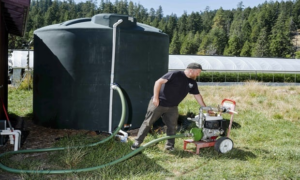Having a bank loan on your cannabis property is usually not the greatest business plan. If you already own a property encumbered by a bank loan, commencing cannabis operations is a risky proposition. If you don’t own property but apply for a bank loan on a parcel to grow, process or sell marijuana, the banker will likely send you away in ten seconds or less. In our experience, even equipment loan offerings by small credit unions to cannabis businesses are vanishingly rare.
Because it’s so hard to get institutional financing for cannabis properties, we have facilitated many seller-carried property transactions over the past few years. Those transactions are a breeze when the seller owns the land free and clear. When the seller does not, however, things can get interesting– especially so when the transaction happens anyway. The vehicle for many of these unusual transactions is a wrap-around mortgage.
A wrap-around mortgage (a “piggy-back” or “wrap”) is a junior mortgage where a seller has one or more existing trust deeds on his or her property– typically, with a bank as beneficiary. Together, the seller and pot farmer or processor, or what-have-you, enter into a land sale contract or a promissory note and trust deed. These documents cover the full purchase price, minus whatever earnest money is agreed upon, and minus any down payment. Every month, the buyer pays the seller, and the seller pays the bank. In a classic wrap, the parties agree not to notify the bank of the transfer, although sometimes a memorandum is recorded in the public record. The laws surrounding wraps differ state by state.
Why do sellers like wraps? Because they can be lucrative, especially in the cannabis industry, where land has premium pricing. If the bank loan is at 5%, and the seller is getting 10% or 12% on a junior note, for example, a wrap can be highly profitable. Why do buyers like wraps? Sometimes, it’s the only way for a cannabis business to get a foothold on a property. The big risk here for both buyer and seller is that the bank will cite the trust deed’s “due on sale” clause, wiping out the buyer’s interest, and resulting in foreclosure for seller. With a cannabis wrap, there may be several contractual levers a bank can pull to trigger this clause: the senior mortgagor is permitting “illegal activity” on the property; the senior mortgagor has given a deed to its junior mortgagee; etc.
Wrap mortgages were prevalent in traditional, non-cannabis property loans five to seven years back, especially in residential real estate. This was due to the slowdown in real estate generally and to the scarcity of bank financing at that time. With cannabis—where bank financing is nearly impossible, still—wraps are one of several creative real estate options for entrepreneurs looking to make an industry play.
It is critical for all parties, including attorneys and realtors, to be aware that a wrap mortgage in the cannabis context often involves a seller triggering the due on sale clause in the first lender’s deed of trust. For that reason alone, we generally steer our buyer and seller clients away from wraps. Do our clients always listen? No. Many cannabis businesses and landlords are already taking on mortgage risk, or are determined to do so, by facilitating weed activity on a mortgaged property. And many take heart in the reality that banks are loathe to call loans: banks love getting paid, hate owning property and often ignore the “due on sale” remedy for convenience.
Given the above, we expect to see a continuing stream of wrap-around mortgages on cannabis properties. After all, when your core business activity involves violating federal law, a little extra business risk may not seem so bad.
For more on the unique issues involved with cannabis real estate, check out the following:
- Cannabis Real Estate 101
- California Cannabis Leases: The 101
- Marijuana Sale-and-Leaseback: Pulling Money From the Land
- Marijuana Property Transactions: The Curious Role of Title Companies
- Bank Loans on Cannabis Property: Tread Carefully
- Oregon Marijuana Laws: Buying and Selling Land is a Trip
- Oregon Marijuana: Finding a Location that Works for Your Cannabis Business
- Marijuana Lease Checklist: Ten Things to Note
- Marijuana Commercial Leases: This Industry is Different, You Know
- Real Property Forfeiture for Marijuana Tenants: Your Marijuana Leasehold is Key
Link – Canna Law Blog





































